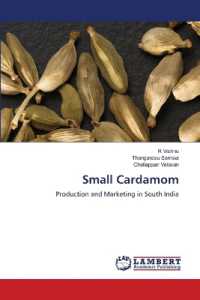Full Description
Access to large data sets has led to a paradigm shift in the tourism research landscape. Big data is enabling a new form of knowledge gain, while at the same time shaking the epistemological foundations and requiring new methods and analysis approaches. It allows for interdisciplinary cooperation between computer sciences and social and economic sciences, and complements the traditional research approaches. This book provides a broad basis for the practical application of data science approaches such as machine learning, text mining, social network analysis, and many more, which are essential for interdisciplinary tourism research. Each method is presented in principle, viewed analytically, and its advantages and disadvantages are weighed up and typical fields of application are presented. The correct methodical application is presented with a "how-to" approach, together with code examples, allowing a wider reader base including researchers, practitioners, and students entering the field.
The book is a very well-structured introduction to data science - not only in tourism - and its methodological foundations, accompanied by well-chosen practical cases. It underlines an important insight: data are only representations of reality, you need methodological skills and domain background to derive knowledge from them
- Hannes Werthner, Vienna University of Technology
Roman Egger has accomplished a difficult but necessary task: make clear how data science can practically support and foster travel and tourism research and applications. The book offers a well-taught collection of chapters giving a comprehensive and deep account of AI and data science for tourism
- Francesco Ricci, Free University of Bozen-Bolzano This well-structured and easy-to-read book provides a comprehensive overview of data science in tourism. It contributes largely to the methodological repository beyond traditional methods.
- Rob Law, University of Macau
Contents
Part I: Theoretical Fundaments.- AI and Big Data in Tourism.- Epistemological Challenges.- Data Science and Interdisciplinarity.- Data Science and Ethical Issues.- Web Scraping.- Part II: Machine Learning.- Machine Learning in Tourism: A Brief Overview.- Feature Engineering.- Clustering.- Dimensionality Reduction.- Classification.- Regression.- Hyperparameter Tuning.- Model Evaluation.- Interpretability of Machine Learning Models.- Part III: Natural Language Processing.- Natural Language Processing (NLP): An Introduction.- Text Representations and Word Embeddings.- Sentiment Analysis.- Topic Modelling.- Entity Matching: Matching Entities Between Multiple Data Sources.- Knowledge Graphs.- Part IV: Additional Methods.- Network Analysis.- Time Series Analysis.- Agent-Based Modelling.- Geographic Information System (GIS).- Visual Data Analysis.- Software and Tools.







